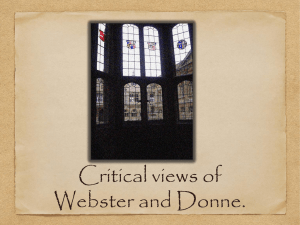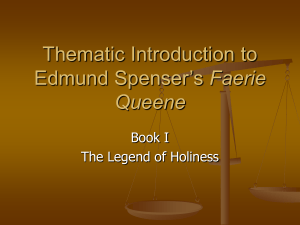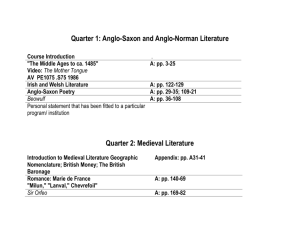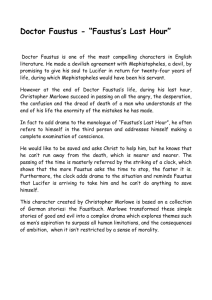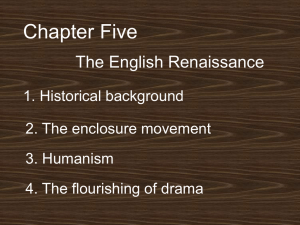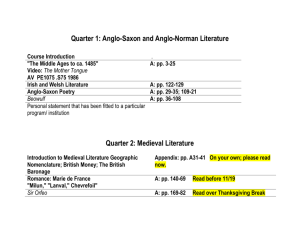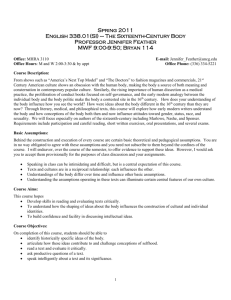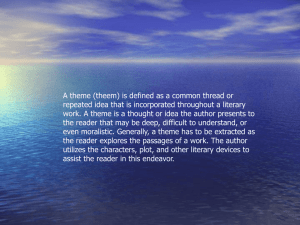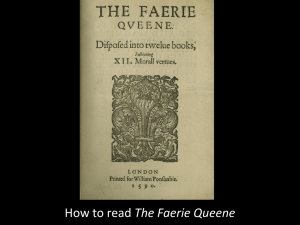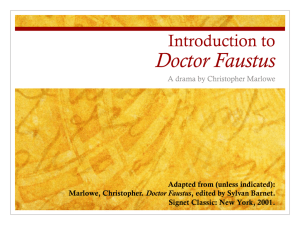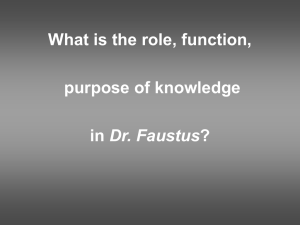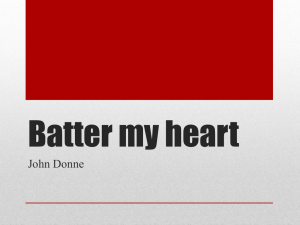Doubt, Belief, and Madness in The English Renaissance
advertisement
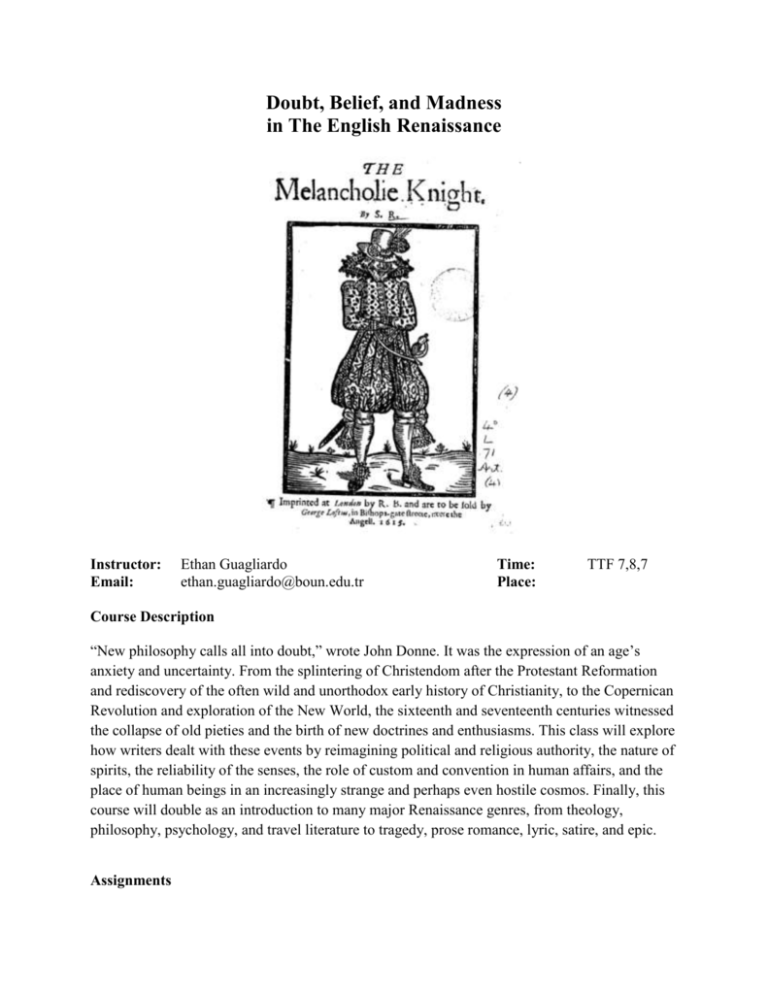
Doubt, Belief, and Madness in The English Renaissance Instructor: Email: Ethan Guagliardo ethan.guagliardo@boun.edu.tr Time: Place: TTF 7,8,7 Course Description “New philosophy calls all into doubt,” wrote John Donne. It was the expression of an age’s anxiety and uncertainty. From the splintering of Christendom after the Protestant Reformation and rediscovery of the often wild and unorthodox early history of Christianity, to the Copernican Revolution and exploration of the New World, the sixteenth and seventeenth centuries witnessed the collapse of old pieties and the birth of new doctrines and enthusiasms. This class will explore how writers dealt with these events by reimagining political and religious authority, the nature of spirits, the reliability of the senses, the role of custom and convention in human affairs, and the place of human beings in an increasingly strange and perhaps even hostile cosmos. Finally, this course will double as an introduction to many major Renaissance genres, from theology, philosophy, psychology, and travel literature to tragedy, prose romance, lyric, satire, and epic. Assignments Participation and Quizzes Responses Midterm Exam Final Exam 20% 25% 25% 30% Participation: Your presence and participation are crucial for success in this course. Regular quizzes will be given and will count as part of this grade. Students missing more than 75% of classes will not be admitted to the final. Responses: You will write 7 response papers (no longer than 1 page, single-spaced) over the course of the semester. When you choose to write these and what you choose to write on will be up to you. However, they must be exercises in close reading. That means that in your responses, you should concentrate on analyzing no more than 2-3 lines of poetry or 3-4 lines of prose. Using a good dictionary like the OED is a must! These responses will be graded on a 1-5 scale, though excellent responses will be given a 6/5. Midterm and Final Exams: Essays and short answer questions. Grading Scale 90-100 85-90 80-85 75-80 70-75 65-70 60-65 AA BA BB CB CC DC DD Weekly Schedule Journeys Outward and Inward Week 1: T Introduction; John Donne, “First Anniversary”. F Thomas Hariot, “A True Report”. Week 2 T Martin Luther, On the Freedom of a Christian; John Calvin, Institutes; Book 1, chapters 3-4. F John Calvin, Institutes; Book 1, chapter 11; Book 2, chapters 1 and 3. Week 3: T Church of England, “39 Articles”; “The Baines Note”; Christopher Marlowe, Doctor Faustus, act 1 (A-text). F Marlowe, Doctor Faustus, acts 1-2 (A-text). Week 4: T Marlowe, Doctor Faustus, acts 3-4 (A-text). F Marlowe, Doctor Faustus, act 5 (A-text) Week 5: Reformation Anxieties T Edmund Spenser, “Error and Archimago,” from The Faerie Queene. F Spenser, “Error and Archimago,” from The Faerie Queene. Week 6: T Spenser, “Despair,” from The Faerie Queene. F Thomas Nashe, The Unfortunate Traveler Week 7 T Nashe, The Unfortunate Traveler F Nashe, The Unfortunate Traveler *Midterm Exam* Skepticism, Madness, and the Supernatural Week 8: T Michel de Montaigne, from “The Apology of Raymond Sebond” F Francis Bacon, “Idols” from New Organon; “Of Truth” and “Of Unity in Religion” from Essays. Week 9 T Thomas Nashe, from The Terrors of the Night; Reginald Scot, from The Discovery of Witchcraft. F Robert Burton, “Religious Melancholy,” from The Anatomy of Melancholy Week 10: T John Webster, The Duchess of Malfi F John Webster, The Duchess of Malfi Religion and Nature in the Lyric Week 11 T John Webster, The Duchess of Malfi F Fulke Greville, “Caelica 56”; “Chorus Tartarorum”; “Chorus Sacerdotum”: John Donne,”The Good Morrow”, “The Sun Rising,” “Air and Angels”, “Love’s Infiniteness”, “Community”, “Love’s Growth”, “Confined Love” Week 12 T John Donne, “Love’s Diety”, “The Will”, “The Relic”, “The Dissolution”, “Farewell to Love”, “Elegy XIX” F John Donne, “Satire III,” “To Sir Edward Herbert.” Week 13 T George Herbert, “Jordan 1,” “The Collar,” “The Forerunners,” “Love 3”; Henry Vaughan, “The World”; Thomas Traherne, “Innocence”; Anne Finch, “A Nocturnal Reverie”. F John Wilmot, Earl of Rochester, “Satire Against Reason and Mankind”
